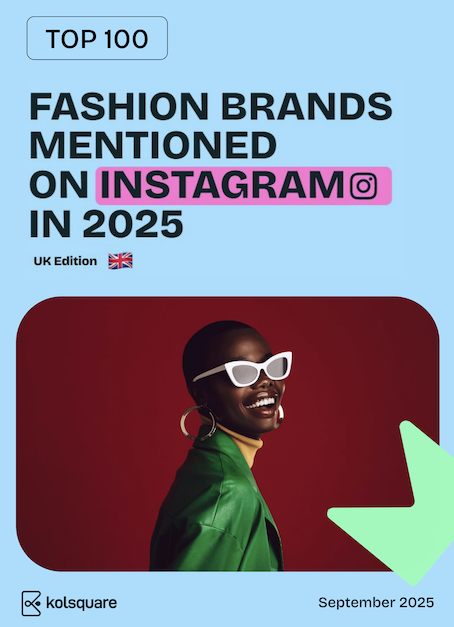Small but Mighty: How In Print We Trust Is Shaking Up UK Fashion Rankings

07-10-2025
Fast fashion may still rule the roost on social media, but new rankings from Kolsquare – Europe’s leading influencer marketing platform show a surprising shift in the fashion landscape. The UK Fashion Top 100, which measures influencer-driven impact across Instagram and TikTok, reveals a powerful undercurrent of change, with eco-conscious disruptor In Print We Trust and pre-loved platform Vinted climbing the ranks and challenging the fast-fashion establishment.
Fast Fashion Still Leads – But the Gap is Closing
Despite growing calls for sustainability, the UK’s biggest fast-fashion players remain dominant. ASOS topped Instagram with an eye-watering £52.1M in Earned Media Value (EMV), generated by nearly 5,000 creators and over 30,000 posts. On TikTok, Primark reigned supreme, with £18.1M EMV and an impressive 7.1% engagement rate.
Other major players include Zara, H&M, and PrettyLittleThing, which, although still in the top tier, slipped 10 places to #11 on TikTok.
But it wasn’t all business as usual. The most impressive movements came from brands you might not expect.
In Print We Trust: The Indie Brand Outperforming the Giants
The biggest surprise of the report? A small London-based brand with a sustainable mission, In Print We Trust, which skyrocketed 40 places to land at #13 on TikTok outperforming big names like River Island, Next, Lululemon and even TK Maxx.
Selling graphic print T-shirts and hoodies made from sustainably sourced cotton, In Print We Trust might not seem like a contender at first glance. But its £2.9M EMV was driven by clever influencer partnerships and fewer of them. Where River Island used 432 influencers, and EGO over 580, In Print We Trust worked with just 132.
What made the difference? Relatability and engagement. The brand focused on micro and macro influencers (mostly female, aged 18–24), who wove the clothing into their daily lives. Their top-performing influencer, 18-year-old @bethanykajtar, delivered 1.7M views and 228K likes on a single post by simply living her life in the brand’s tee – no sales pitch required.
In fact, In Print We Trust achieved a 7.3% engagement rate higher than Primark’s 7.1% and more than double River Island’s 3.4%. The content wasn’t about hauls or style tips. Instead, it showed real people wearing the brand while talking about real things like university life, friendship, family, and mental health.
A quiet endorsement from the Beckhams didn’t hurt either. Nicola Peltz Beckham posted Harper wearing the brand, without any official tie-in – a moment of organic celebrity influence that helped catapult the brand into viral territory.
Vinted’s Rise: Pre-Loved with Power
Another eco-focused player making waves is Vinted, the platform for buying and selling second-hand fashion. It claimed the #19 spot on TikTok, further evidence that consumers are increasingly engaging with more conscious alternatives to fast fashion.
While Vinted didn’t see the same meteoric leap as In Print We Trust, its steady climb into the top 20 reflects growing interest in circular fashion and signals potential for even more growth if supported with strategic influencer investment.

Instagram: Still a Fast Fashion Leader
On Instagram, fast fashion and sportswear brands continue to dominate. ASOS, Zara, and H&M led the charge, with Gymshark standing strong at #5 nationally and #6 in Europe. White Fox Boutique made a dramatic leap of 22 places to reach #8, while in jewellery and accessories, Monica Vinader, Joma Jewellery, and Boho Moon claimed top spots.
Luxury, meanwhile, remains a European stronghold – with Gucci, Miu Miu and Chanel continuing to lead the conversation on Instagram, and Gucci, Dior and Coach topping TikTok’s luxury rankings.
TikTok: A New Battleground for Disruptors
TikTok is where the real shifts are happening. Activewear brands like DFYNE and AYBL are rivalling legacy players, while In Print We Trust and Vinted are proving that niche, value-driven brands can muscle into mainstream territory.
Weekday, the Swedish fast-fashion brand founded in 2022 made the single biggest leap, up 93 places to #24. But it was In Print We Trust’s tightly executed influencer strategy that stole the show: fewer influencers, higher engagement, and stronger brand loyalty.
What It Means for the Industry
“The dominance of fast fashion is still clear, and it’s disappointing that sustainability isn’t yet a major sales driver,” said Quentin Bordage, CEO of Kolsquare. “But In Print We Trust is proof that smaller, eco-conscious brands can compete when they tap into the right communities and use influencer marketing intelligently. With activewear, jewellery, and short-form content driving momentum, British brands are shaping global conversations on Instagram and TikTok.”
This latest report reveals the fashion conversation is no longer just about scale – it’s about authenticity, community, and connection.
To view Kolsquare’s reports tap the following links:























